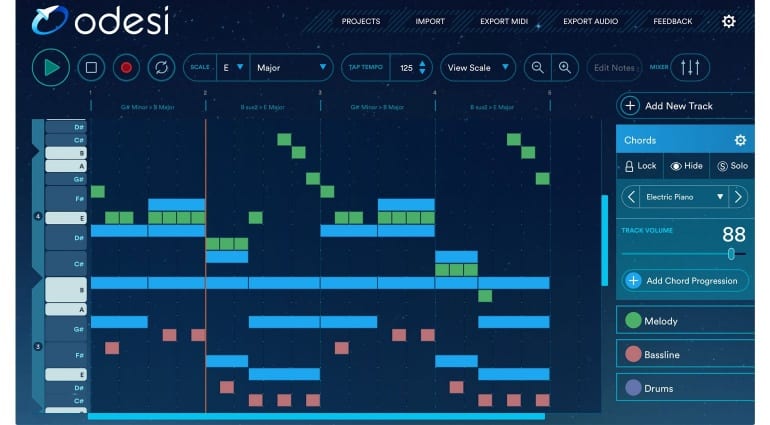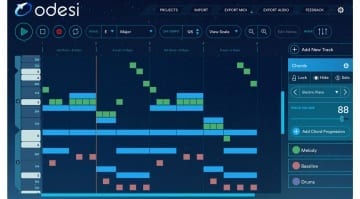Let Odesi composition software write you a hit song
I find myself back in the discussion about what constitutes individual creativity and what’s just an automatic music making machine. But then that’s terribly difficult to define and you end up wandering down the road of purity where you have to make your own loops and are never, ever allowed to use a preset. But then if you’re not manufacturing your own hard disk, developing your own recording software and playing hand-made instruments forged from pieces of your own body then surely you must be cheating. Odesi, newly released on Windows, is here to help you write melodies, basslines, chord progressions and beats while driving the musical snobs crazy.
Odesi sees itself as the beginning of your musical journey, a place to come up with the guts of your next hit record ready for finishing in your chosen DAW. Essentially it’s a MIDI sequencer focused on creating looped patterns for traditional verse and chorus song structures. You might start out recording some chords and Odesi will recognise those and add a simple bassline to follow. You can then select a chord or chords and quickly shift them around by choosing different chords and progressions from a menu. You can lock to different key signatures and harmonic modes helping you to never play a bum note. But then why play anything yourself when you can get Odesi to randomly throw in a chord progression based on the chosen key – I guess it’s a lot like auditioning loops but where you have a lot more control over the sound. The sounds come from VST or AU instruments.
Along with the automatic chord progressions and basslines you can also select from a palette of rhythmic patterns. Apparently they’ve analyzed some of the biggest hits in music and pulled out a bunch of rhythms that were commonly used. You can, of course, then dial in a drum pattern to fit with the overall groove, add a melody line and before you know it your track is pumping and the room is jumping to your awesome musical talent. You can edit the patterns and rhythms and make adjustments so that you don’t have to end up sounding like everyone else – although probably the point is to sound like everyone else, to sound like a hit record, to follow the beats of what’s been successful in order to give you a similarly successful track.
When I started looking at Odesi I was pretty upbeat about it – I appreciate tools that are going to make my life easier and the underlying philosophy of Odesi is that it helps you try stuff out quickly and easily. But I kind of assumed that it would work within my DAW, within my workflow where it might suggest a change that I hadn’t thought of or give me a fresh take on something. But the more I looked into it the more I realised that it’s a MIDI loop creator that’ll give you a song like holding one finger chords on a home keyboard with auto-accompaniment gives you a song – and I then realised I’m more of a musical snob than I thought.
On the other hand why not create for yourself some MIDI loops? If ultimately we’re all using similar chords and progressions, rhythms and basslines then why write them from scratch every time when you produce and personalise the basic structure of your song quickly and easily in Odesi. If we’re happy to use something from a Loop CD then isn’t it actually better to build that loop yourself, using your own sounds, and your own unique choices? So yeah, I’m in two minds about it.
The interface looks great, has a StageLight feel about it and I’m pretty sure the key locking feature is stolen straight from Open Lab’s DAW software. It runs in a browser and so can be used anywhere on anything and all your projects are automatically saved to your online account. I think after initially feeling Odesi was quite interesting and then being overwhelmed by my cynicism, I’m finding myself looking at it as a positive and potentially fun way to mess about with some sound and perhaps start producing my first hot track.
Odesi is created by Mixed In Key and was released for OSX last year and is now available on Windows for $49.
More information on Odesi can be found on their product page.








